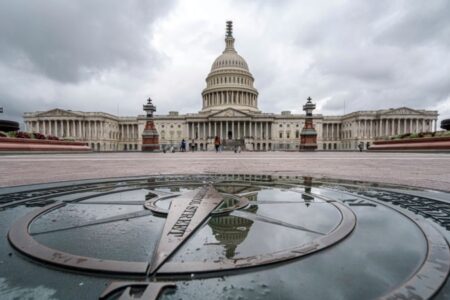WASHINGTON — The Democratic-led U.S. Senate returned on Monday for a showdown with the Republican-controlled House of Representatives over government spending, disaster relief and defense policy before President-elect Donald Trump ushers in a new era of single-party rule next month. The main challenge for lawmakers over the next three weeks is to avert a pre-Christmas partial government shutdown by striking a bipartisan deal to fund federal agencies beyond Dec. 20, when a current stopgap spending measure is due to expire. The debate will include a nearly $100 billion emergency disaster relief request from President Joe Biden for areas of the U.S. Southeast hit by hurricanes Helene and Milton, and other communities struck by natural disasters. Congress also faces a Jan. 1 deadline for raising the federal government’s debt ceiling, though lawmakers and aides say that extraordinary measures employed by the Treasury Department are likely to postpone the expected “X” date for default well into 2025. Senate Majority Leader Chuck Schumer indicated on Monday that lawmakers are negotiating a short-term stopgap funding bill known as a continuing resolution, or CR, rather than a package of annual spending bills that would fund the government through fiscal year 2025, which ends on Sept. 30. Schumer did not disclose details about a potential CR, which House Speaker Mike Johnson has said would run into early next year. Trump’s allies are pushing for a three-month stopgap that supporters say would allow their party’s incoming political trifecta to dismantle current Democratic spending initiatives and policy priorities early in the new administration. Legislative action on government funding is not expected to begin in the House until the last of the session’s three weeks, timing that could raise risks for Johnson’s slim 220-213 Republican majority if they opt for a partisan measure first. House Republicans failed to pass their own partisan stop-gap measure in September and had to rely on mainly Democratic votes to narrowly avert a shutdown weeks before the Nov. 5 election. Trump’s transition team did not respond to a request for comment. Top lawmakers have yet to say how they intend to handle a Biden request for emergency disaster relief. The head of the Small Business Administration recently testified to Congress that the agency’s disaster loan program for homeowners, renters, and businesses ran out of money in October, leaving more than 60,000 loan applicants waiting for assistance. Congressional aides said a disaster relief package would likely be attached to a CR. But the first objective for Congress this month is likely to be passage of the National Defense Authorization Act, or NDAA, annual legislation that sets policy for the Defense Department, according to congressional aides. Floor votes could come as early as next week, according to aides.
Congress returns, facing spending, disaster relief issues ahead of change in administrations
